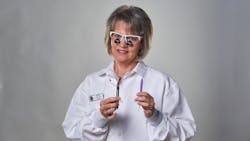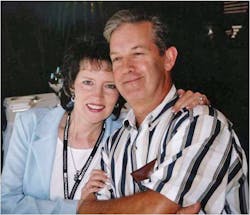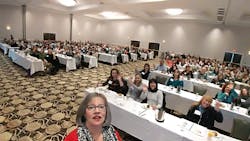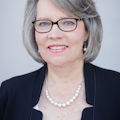6 things I want you to know
I’ve thought long and hard about what I’d like to say in my final Staff Rx column. It’s not as easy as I thought it would be, but the time has come.
When I began the journey of building my own business, I didn’t intend to become a writer. But my mentor, Linda Miles, told me that one of the best ways to build credibility was to be published. When I asked what I should write about, she said, “Write about things for which you are passionate.” She also told me not to get discouraged if the first piece I submitted was not accepted. The fourth piece I submitted to Dental Economics was accepted, and the fire was lit.
My goal over the past 24 years has never changed—addressing the real-world challenges of practicing dental hygienists. After my column gained traction, I never had to worry about subject matter. Dental hygienists all over the country started writing to me and sharing problems they were having in their practices.
Additionl wisdom from Dianne:
Of course, there were times when I did not have answers for particular problems, but I developed a wonderful network of professionals whom I could call upon for assistance. I learned how to research issues when I did not have the expertise and ask pertinent questions of people I’d come to trust and respect, including accountants, periodontists, attorneys, hygiene educators, and others. I learned to invest in my own career development by joining various professional groups that helped me hone my speaking and consulting skills.
Once I got published, I found that I really loved to write! Every column or feature I wrote became my original creation, and I found the process to be incredibly rewarding. My articles are my “babies,” and I’ve given birth hundreds of times! Over the years, I kept a file of “undeveloped topics” in my computer, so I never had to scramble to have something to submit to my editor. I do not write well under pressure, and I always wanted to stay ahead of my deadlines. One of my proudest accomplishments is that I have never missed a deadline; I always took my writing seriously. Having a monthly column was a rare privilege, one for which I will always be grateful.
The year 2022 marks 50 years for me in dentistry. I began in 1972 at the front desk of a dental practice in Thomasville, North Carolina. During my four years there, I also learned chairside assisting under the baptism-by-fire method that happened one day when our lone chairside assistant went to lunch and never returned. The hygienist had a full schedule, and the doctor had two crown preps to do. When it was apparent the assistant was not coming back, Dr. McGhee came to the front desk and said, “Well, Dianne, I reckon you’ll have to help me.”
I laugh now when I think back to that time, as I was his only option. Bear in mind that I’d never, ever held a suction device, nor did I know diddly-squat about assisting. But he was a great teacher, and I found that I really did like assisting! Dr. McGhee was like an artist with a drill instead of a brush, and I discovered that clinical dentistry was really interesting.
So, I took the plunge, applied to dental hygiene school, and got accepted the next year. I graduated in 1978. Hygiene school was difficult, but I loved it. The feeling of breaking off that first big chunk of calculus lit another fire in me that will always burn. I found there was nothing more professionally rewarding than taking a patient from disease to good oral health through a series of appointments. Observing gingiva go from “hamburger” to tight, pink, and stippled due to my efforts, along with motivating my patient to practice better oral hygiene, produced a feeling of doing something good and worthwhile in the world. Of course, I also found that connecting with my patients made everything more rewarding and even fun. Not all patients are easy to love, but a hygienist (or dentist) who does not love his or her patients will have a hard time forming connected relationships. Without relationships, the job becomes, well, just a job.
After many years of clinical hygiene, I felt the need to stretch and grow, so I began an educational journey toward my bachelor’s degree. I chose a business track because I wanted to branch out into consulting work. In 1996, I graduated with a bachelor’s degree in human service management. Then, in 2009, I completed a Master of Business Administration. It was all hard work, but I felt I needed more education to build my credibility. Those eight years of education have served me well and opened doors that otherwise would not have been opened.
So, here I am today, the reputed “Ann Landers” of the dental hygiene world, giving my final words of wisdom to my dental brothers and sisters. Here’s the list, in no particular order of importance:
- If you ever aspire to do anything other than chairside hygiene, go back to school. Get all the education you can. Set a goal, and do not allow anything to deter you.
- Your job is not about you. It’s about those you are privileged, as a registered or licensed dental hygienist, to serve. Your patients sign your paycheck, not your boss. Without patients, there’s no reason to go to work. Never lose sight of this.
- Do not participate in office politics or gossip. Avoid it like a contagious disease, and don’t socialize with people who revel in stirring up the pot.
- If possible, do not stay in a toxic office. Life is too short to ruin your physical and emotional health by working with toxic people.
- Take care of your body. After all, it’s the only one you have. Invest in things that will increase your ability to do your best, such as high-quality loupes and a headlamp.
- Come to work well rested and prepared for a productive day. Leave your personal problems outside the office. Earn respect by being respectful to others and make your boss glad you work there.
I could go on, but the time has come to bid all my readers a fond farewell. It has been my privilege to serve you over these past 24 years, and I hope our paths will cross as I continue presenting continuing education courses across the country.
With a heart full of admiration, respect, love, and thanks,
Dianne
Editor's note: This article appeared in the February 2022 print edition of RDH.
About the Author
Dianne Glasscoe Watterson, MBA, RDH
DIANNE GLASSCOE WATTERSON, MBA, RDH, is a consultant, speaker, and author. She helps good practices become better through practical analysis and teleconsulting. Visit her website at wattersonspeaks.com. For consulting or speaking inquiries, contact Watterson at [email protected] or call (336) 472-3515.
Updated June 30, 2020



